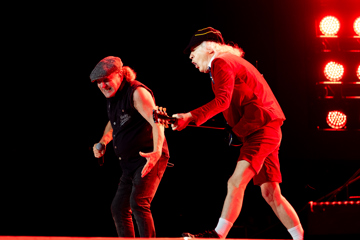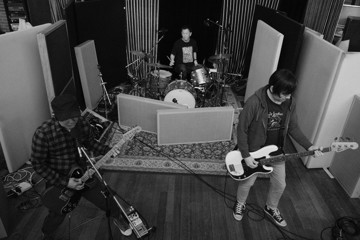'Steve Jobs' Is A Damning Character Study That Shines Bright
And Michael Fassbender does a far better job than Ashton Kutcher
STEVE JOBS

Steve Jobs is written, by Aaron Sorkin, as a piece of theatre: a three-act play in which words are many, settings few, time real. It’s, indeed, a piece of meta-theatre: going behind-the-curtain for a look at preparations for product launches in 1984, 1988, and 1998; backstage, as always, a place where chaos lurks behind the ordered façade, and personal demons threaten to derail the show. The staginess of its history-repeating acts isn’t just acknowledged, but played up; Jobs a central subject obsessed with stage-managing and brand-management. The thematic and dramatic grist of Steve Jobs is the dissonance between who its hero wills himself to be and who he really is, between the on-stage performances and the backstage acts. He’s a perfectionist whose perfect public façade is forever showing cracks.
Michael Fassbender plays Jobs, and, gladly, there’s none of the sketch-comedy impersonation that Ashton Kutcher tried to pass of as acting in 2013’s boilerplate biopic Jobs. Fassbender plays Jobs less as a famous-person-you-know, more as the character written on the page. Fittingly, given ol’ Fass is fresh from drawling his way through Justin Kurzel’s murderous Macbeth, Sorkin pens the Apple impresario as Shakespearean royalty: all uneasy head and murderous ambition, a man of inner torment and fabulous soliloquy.
Don't miss a beat with our FREE daily newsletter
It matters not that Jobs was never so eloquent; that the accountant’s truths of respectful biopic-ing have essentially been set ablaze for high theatricality bearing little relationship to real reality. Every character, herein, talks in full-blooded Sorkinisms because Steve Jobs is a writer’s piece, both at conception and on screen. This is particularly miraculous given the film is directed by Danny Boyle, the horrifying, hyper-editing maximalist who once turned a grim tale of a guy sawing his own arm off into a feature-length Coke ad. Sorkin’s prolix penmanship should be hailed if only for the fact that all its rapidfire words beat back Boyle’s worst tendencies; there no time for time-lapse-photography sequences when the dialogue flows fast and furious.
Rather than leaving it up to Boyle to show theme, Sorkin has his characters speak it aloud. Befitting its meta-theatrical text, the script’s central ideas are tossed around in conversation. The through-line across its three acts —its three markers of a man’s life— is its anti-hero’s denial of his paternity, and the flesh-and-blood child, inconveniently right there, that makes his careerist stand seem ever-more horrifying. In its most forgiving reading, it’s a tale of a man learning to let love in; to value emotion over economics. But, when said daughter (played, at this point, by Perla Haney-Jardine) calls Jobs an “unconscionable coward” late in the film, it’s clear that this is no hero’s journey, no brand-managing hagiography.
As character study, Steve Jobs is ultimately damning, and feels all the truer for it. The titular character is electric protagonist, charging life and conflict and intensity into everything he touches, the role shot through with Fassbender’s abundant charisma. But this is anything but another biopic’s portrait of a Tortured Genius, whose virtues and vices were each equal elements in a trailblazing life. Seth Rogen’s Woz, the protagonist’s eternal off-sider, is there as a constant reminder that a PR persona can never replace a man, delivering timely weary laments and skewering critiques. His best line both employs computer metaphor and speaks the film’s essential theme aloud. “It’s not binary,” Rogen says, “you can be decent and gifted at the same time.”
BROOKLYN

It’s that choice headstrong Independent Women Pt.2 have been making since, if not Time Immemorial, at least Time Brontë: which man to marry? In Brooklyn, Saoirse Ronan isn’t a Victorian heroine, but her independence is still defined by which eligible gentleman she’ll get hitched to.
Having immigrated from gossipy small-town Ireland to the big-city Big Apple in the early 1950s, Ronan struggles to make sense of a whole new set of fabulous frocks fashioned by the wardrobe department. But with a lil’ loving help from priestly ol’ Jim Broadbent, she lands a job at a department store presided over by glamorous Jessica Paré(!), ladles nourishing gruel at an Irish ex-pat soup kitchen, and studies bookkeeping at night just to let you know that she ain’t no wallflower.
But even women-refusing-to-bow-to-the-expectations-of-the-era —even budding accountants!— need love. And, lo, at the end of Brooklyn’s first act, along comes Emory Cohen, an Italian-American weighed down with a family of ethnic caricatures and awkwardly-contrived dialogue about baseball. But, he’s also full of pitched-woo and good-guy devotion and teaches her to eat spaghetti, so, shit, why not get married?
Yet, after tissuebox-clutching Tragedy lures Ronan back to Ireland, all of a sudden there’s polite, pale Domhnall Gleeson, wearing proper trousers and inheriting family wealth and being a good local boy who Ronan’s mum is all keen to match her with. Does she return home to the familial bosom of the Emerald Isle, land that birthed her? Or does Ronan return to New York City, and her fellow-immigrant sweetheart, with his hard-scrabble beginnings and big dreams, and try and carve out a brand new life?
Which is all to say, really, that Brooklyn feels like a fabulously-acted and lavishly-appointed telemovie. Ronan is great and all, but there’s little weight to its light script, and a sense of genuine convention to its storytelling.







